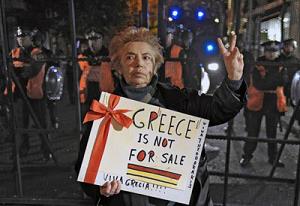Multinational Vultures Cluster Round Greece: Airports, Ports, Tourist Resorts, Energy Assets and Utilities

by Political Concern
The sentence of privatisation, which Britain has found inefficient and expensive in most cases, has been passed on Greece.
On July 12, the summit of eurozone leaders dictated terms to Greek Prime Minister Alexis Tsipras, who accepted all, including the sale of Greece’s remaining public assets.
Business Insider reports that Eurozone leaders demanded that Greek public assets be transferred to an independent fund renamed the Hellenic Republic Asset Development Fund (HRADF), to help to make the scheduled repayment of the new loan and recapitalization of banks and other assets. The fund was set up in July 2011 after the Greek sovereign debt crisis and opposed by Syriza, which suspended most planned privatisations when it came to power.
Ben Chu (the Independent) reports that Germany originally proposed that HRADF be run from Luxembourg by a German state bank, prompting accusations on social media of a German “coup”.
‘Big-ticket items’ listed on the HRADF’s website for interested buyers
- state lottery,
- horse-betting,
- Olympic venues,
- Athens International Airport,
- 37 regional airports,
- Port of Piraeus and 100% of the shares of 11 other ports,
- many marinas,
- tourist resorts,
- state real estate especially on picture-perfect islands,
- thermal springs on the mainland,
- hotels with high historical and cultural value in privileged locations,
- Greek real estate holdings in New York, Washington and Belgrade
- And the Public Power Corporation S.A., which provides energy to four-fifths of the country’s population.
Other companies which may be sold include a natural gas importer and distributor, three oil refineries, Athens water company, the postal provider, ELTA, more than 400 miles of roads, TRAINOSE (railroad and bus transport) and ROSCO which maintains Greek trains.
Ben Chu adds that the IMF estimates Greece’s saleable state assets were worth around half the sum needed and that the proceeds from future privatisations are likely to be only €500m a year: “At that rate the €50bn would not be reached for 100 years”.
A ‘smoke and mirrors’ measure?
His conclusion: “(T)he fund is more like a face-saving measure by Germany, designed to give the impression to German voters that the Greeks will pay for their own bailout”.
But where will this leave Prime Minister Alexis Tsipras, who was elected largely on a promise to stop and reverse high-profile privatization of valuable state-owned assets?
And how do the Greek people regard these measures?
Copyright Political Concern 2015


